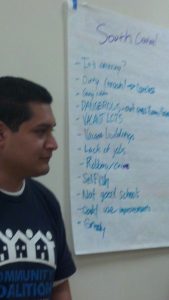On Monday night I sat in on a community organizing action in Del Norte County in Northern California, as part of my reporting on a book project on community health. And organizing community members so they make their voices heard – effectively – is one sure way to improve a community’s well being, as collective voices have great power to bring about change.
One model for community organizing is called PICO (“People Improving Communities through Organizing”), and it’s active in Del Norte.
Without going into the details of how PICO works, I’ll share one rule it stresses that really struck me. The lead organizer explained to the assembled group why PICO-run organizing actions, which typically last an hour, ALWAYS start on time, and ALWAYS end on time. To set the scene of an action, in the audience are power brokers (i.e. elected officials, agency heads, executives, etc.) who are asked to publicly commit to supporting an action deemed critical by the organizers.
The mandate for on-time scheduling is rooted in respect, and the philosophy that “power respects power.” When you start and end on time, you’re respecting other peoples’ time.
But there’s more to it than that, pointed out the leader of Monday’s action: Powerful people are often surprised when rabble-rousers (as they’re sometimes stereotyped) like community organizers are highly organized, and start precisely when promised – with all materials in order. And they’re just as impressed when an action ends when promised.
“Arriving prepared and on time shows you’re a team with power,” said Josh Norris, the lead organizer of a new organizing committee that’s formed in Klamath, Californa.
I’ve always viewed timeliness as a courtesy, but this adds a new dimension. It also confers power. That’s a new reason to follow that old rule of etiquette.

